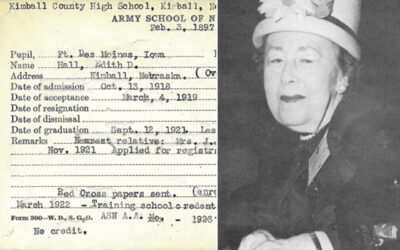By Matt Skoufalos
Health care was always a part of family conversations throughout her childhood, Gina Garozzo-Jones said. Her Sicilian immigrant grandmother only had been allowed to attend school up to the sixth grade, and always said that if she could have done anything, she would have been a nurse. The family took heed.
“My grandmother had a very profound impact on all of her grandchildren,” Garozzo-Jones said. “Straight out of high school, I went to a technical school to become a surgical technologist. Part of my externship was 200 hours in sterile processing, and then I never left.”
Today, Garozzo-Jones is the director of sterile processing at Virtua Voorhees Hospital in Voorhees, New Jersey, working in the specialty that has been her career focus, save for only a few years spent in materials management. At the time she began her education, however, sterile processing wasn’t a job Garozzo-Jones knew existed – which she said isn’t an uncommon circumstance.
“I run into people here and there who don’t realize there’s this whole group of people who make surgery happen,” she said. “Coming into this, I don’t think everybody always understands what an impact they have. Just knowing that everything we touch touches somebody’s life, and being in this field, you really are the unsung heroes of the hospital.”
“As repetitive as it can be, it’s still different every day,” Garozzo-Jones said. “I just love the OR. You could do 10 of the same procedure every day, but every one’s different because everyone’s anatomy is different.”
In addition to general surgery services, Virtua Voorhees also makes use of minimally invasive surgical techniques and robotics, both of which have contributed significantly to the evolution of the field of sterile processing, Garozzo-Jones said.
“It’s a whole new breed [of device],” she said. “They’re so much more sophisticated and complex, and there’s a lot more detail for managing them. It takes a lot more time, and it requires more education for the staff. It’s a lot more complex.”
As technology has changed in the surgical space, adding new devices with expanded functionalities, sterile processing of the components used in robotic and minimally invasive surgeries has become comparably more complex, from inventory management to understanding computerized elements of surgical devices that require additional steps to break down, disinfect and reassemble.
“It’s how technology has changed for surgery for us,” Garozzo-Jones said. “We have a few forms that we can use for sterilization, and many of them have different parameters. The techs have to know each item and how it’s processed. They have to know how to select the right parameters for processing them.”
After 20 years in the field, the last four of which she has spent in her current role as director of sterile processing, Garozzo-Jones said her favorite element of the job is problem-solving.
“There’s a logic, there’s an answer, there’s a substitution,” she said. “There’s always something else that can solve the problem, and I like being able to think of that and offer a solution.”
Garozzo-Jones also has worked in the sterile processing field long enough to see other specialists throughout the hospital environment take greater notice of its contributions. The role of sterile processing became significant enough in the past decade to draw not only her notice, but that of her peers. Not only has it been gratifying to be involved in the work that underpins health and safety in the hospital, but the extra attention also helps to more clearly define those roles.
“For a long time in health care, I’ve seen departments work in silos that didn’t include sterile processing, and I think there’s been an acquired respect for sterile processing in the last 10 years that wasn’t there before,” Garozzo-Jones said. “Now there’s such a focus on sterile processing and standards and guidelines that we need to follow.”
“We’re held to a higher standard at this point, and recognized as playing this integral role in preventing surgical site infections,” she said. “We play a big part in some of the decisions that are made, where before, 20 years ago, we weren’t even considered or pulled into meetings. Our staff will participate in shared governance, where they have an opportunity to speak up, to give feedback for changes on things that they see as an issue.”
Garozzo-Jones is a member of the Healthcare Sterile Processing Association (HSPA), which supports the specialty with continuing education coursework and certifications, and publishes projects from its professional membership. At Virtua, some of the sterile processing staff participated in a project with some of the OR nurses and scrub techs, which led to some consolidations of surgical instrument trays, and eventually, a poster for AORN (the Association of periOperative Registered Nurses). New Jersey requires its sterile processing professionals to pass certification requirements that include a 400-hour externship; health facilities like Virtua have begun partnering with area colleges and universities to continue to offer their sterile process nursing students places to hone their skills.
“We’re very fortunate to have associations with those colleges so we get some of their students that come here as well,” Garozzo-Jones said. “It’s awesome to get to teach the up-and-coming generation. You have to have a growth mindset; you have to be willing to learn, take feedback and just continue to want to better yourself.”

Presently, Garozzo-Jones is herself a full-time student in addition to her work at Virtua Health. In March 2024, she anticipates completing a bachelor’s degree in business administration and Healthcare Management from Liberty University, and plans to begin her Master’s in Business Administration later in the summer. She plans to remain in sterile processing, but if her career were to advance into a leadership role, she said she’d love to find it with Virtua Health.
“I love the culture here,” Garozzo-Jones said. “There’s a culture of respect, and it’s from the top down. Everybody respects each other; everybody’s courteous, everybody’s kind; everybody helps each other. You can see that everybody’s part of the team.”
When she’s not at work or school, Garozzo-Jones supports her daughter’s interest in field hockey, which has taken the South Jersey family to tournaments up and down the eastern seaboard, as far as Florida, Virginia and beyond.










